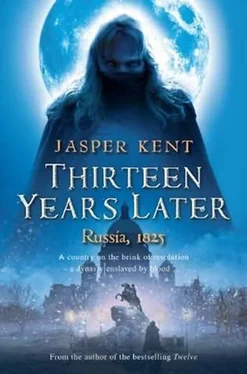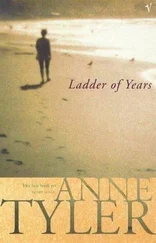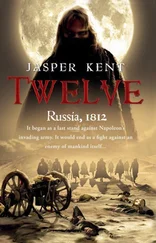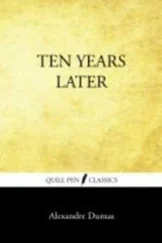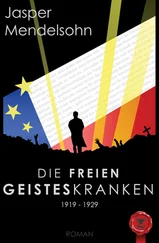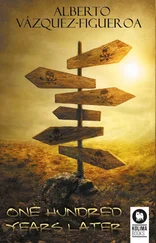‘Show yourself,’ he said firmly. The confidence in his voice was real, born of years of power. Some might think it foolhardy, but it was here that he felt safest of all. This was the monastery of Saint Aleksandr Nevsky, a saint whose name the tsar bore, in the place where the Lord had revealed Himself to the tsar, through His word, at the time of Russia’s direst need. If God was going to protect him anywhere, it would be here.
A face appeared from the gloom. It was a face that was familiar to him, though he could trace its changes over the years. The jaw was still broad, though the skin had gained some wrinkles. The man still wore sideboards, but the light-brown hair was now flecked with grey. When Aleksandr had first seen that face, through monstrous eyes that were not his own, he had felt sure it was the image of an enemy. He had seen it in the flesh many times since, and was now convinced that it belonged to an ally.
‘Colonel Danilov,’ he said, offering his hand.
Danilov bent forward and kissed it. Aleksandr looked down on him with a certain distaste. He was, after all, a spy. It was not a gentleman’s profession, but it was a necessary one. It was best to treat such a man, much like any other soldier, as a tool, to be directed rather than embraced. And yet the vision of him that Aleksandr had seen in 1812 proved that Danilov was more than just a soldier or a spy. Time would reveal the truth.
‘I had to speak with you before you left,’ said Danilov.
They first had met, in the flesh, just days before Napoleon’s abdication – his initial abdication, in 1814 – on the recommendation of Aleksandr’s deeply missed field marshal, Prince Barclay de Tolly, who had told him that Danilov, then a captain, had been one of those who had helped to save Moscow. Aleksandr had flinched as he saw that face for a second time, but had not mentioned his recognition of it, nor had he done so since. Danilov had said nothing either, though his presence in Moscow at its darkest hour, just when Aleksandr had seen the apparition, could have been no coincidence. He spoke French perfectly – not the way Russians spoke it perfectly, even the tsar could manage that, but the way the French themselves spoke it. Aleksandr had wanted to get a feel for how the people of Paris were thinking, and Danilov was the ideal man to discover it. He had done his job well, and had continued to work directly for the tsar ever since – though the enemy had changed.
‘It’s certain then?’ said Aleksandr. ‘Assassination?’
Danilov nodded. ‘It’s too late for reform now. It won’t assuage them.’
The man was no politician. Aleksandr had learned long ago that reform only encouraged revolutionaries and he’d learned also that reform was not what his people wanted. Above all, they – the Russians, the whole of Europe – craved peace. Aleksandr had given them that, for a decade now. For all but a few of his subjects, it was reason to love him.
‘Who will do it?’ he asked, leaning forward slightly and tilting his head to listen; since childhood his left ear had perceived almost nothing.
‘They talk of a garde perdue – a separate group to do the job, without those in charge taking the blame.’
It was sensible – that was how Aleksandr would have done it. Somewhere inside him a voice commented that that was how he had done it, but he dismissed the idea. He had never dreamed it would be necessary for his father to be killed.
‘How long do I have?’
‘At least until next summer.’
‘They won’t attempt anything while I’m in Taganrog?’
‘I doubt it,’ replied Danilov. ‘The Southern Society is based mostly around Tulchin and Kiev, and that’s still a long way away.’
‘Can we be sure they trust you? They could be feeding you a line.’
‘If they are, you’ll know soon enough.’ Aleksandr found Danilov’s grim sense of humour distasteful at the best of times, but he understood it had been forged out of experience. From what he had heard, Danilov had been part of a squad of sixteen when the French invaded – four officers and twelve men. By the time Napoleon had departed, he was the only survivor.
They fell into silence. Aleksandr pondered the implications of what he had been told. He’d allowed these societies to grow – both in the north and in the south – when he could have crushed them at any time. But to destroy them too soon would have been fruitless. They would have scattered and re-formed. Now, though, the time was approaching when he would deal with them all – before they could move against him.
‘I will act when I return from Taganrog,’ he said. ‘I’ll need names by then.’ He didn’t reveal to Danilov just how many names he knew already. What would be the benefit?
‘Unless I can diffuse the situation.’
It was understandable that Danilov saw hope of redemption in these men – he had fought alongside many of them. For Aleksandr a quiet resolution seemed neither probable nor desirable. But if that hope was the price of Danilov’s loyalty, it was unwise to disabuse him of it.
‘I think you’ll find that impossible, Colonel,’ said Aleksandr, ‘but my prayers will be with you if you can.’
Danilov saluted and the tsar returned the gesture, then he turned and disappeared into the darkness of the passageway. The sound of approaching footsteps came from another direction. Aleksandr turned to see that the metropolitan had come looking for him. He straightened his jacket and marched briskly along the corridor to the front of the monastery.
Outside, his calèche was waiting for him, its three horses shaking their manes as if impatient. It was a humble carriage, but best suited for the journey. His wife, the Tsaritsa Yelizaveta, would follow later in grander style. A small crowd of monks had gathered, and was now joined by the metropolitan.
Aleksandr leapt nonchalantly on to the calèche and hid the pain it caused in his legs and back. He rarely forgot his forty-seven years, but on those occasions when he attempted to, his body soon reminded him. He raised a hand and waved at the assembled holy men.
‘Pray for me,’ he said. ‘And for my wife.’
With that, he heard the sound of the driver’s whip and the carriage began to move. Amongst the crowd, he noticed the shadowy figure of Colonel Danilov observing the departure. There was a man he hoped would do more than pray for his safety.
The tsar remained standing as the calèche drove away. His escort was small and did not block his view. Behind him, the Nevsky Prospekt led straight to the centre of Petersburg, just five versts away. Ahead of him, almost fifteen hundred versts hence, lay Taganrog, and what else, he knew not.
He remained upright, with one foot inside the carriage and one on the running board, looking back the way they had come. Only when the towers of the monastery, lit solely by the stars and the candles that shone dimly from its windows, had vanished from view did he sit down.
The writing was in French. The destination was Ragusa, on the Dalmatian coast. The message was brief:
I have heard from Saint Petersburg. He is on his way.

DMITRY FELT THE KEYS BENEATH HIS HANDS. ONLY HIS TWO ring fingers did not make contact. The chord was C minor: C-E -G-C in the left hand, the same in the right. He had not chosen it for any particular reason, but his hands came to rest there naturally. He closed his eyes and waited.
He sat still at the harpsichord for over five minutes, in complete silence, his fingers touching the keys but not striking them. Music danced through his mind, as clearly audible as if it were being performed in the very room in which he sat. Orchestras poured out their melody, along with pianofortes, church organs, even human voices. Tunes never before played leapt from instrument to instrument, sometimes imitating familiar styles, sometimes in forms that would scarcely be thought of as music.
Читать дальше
